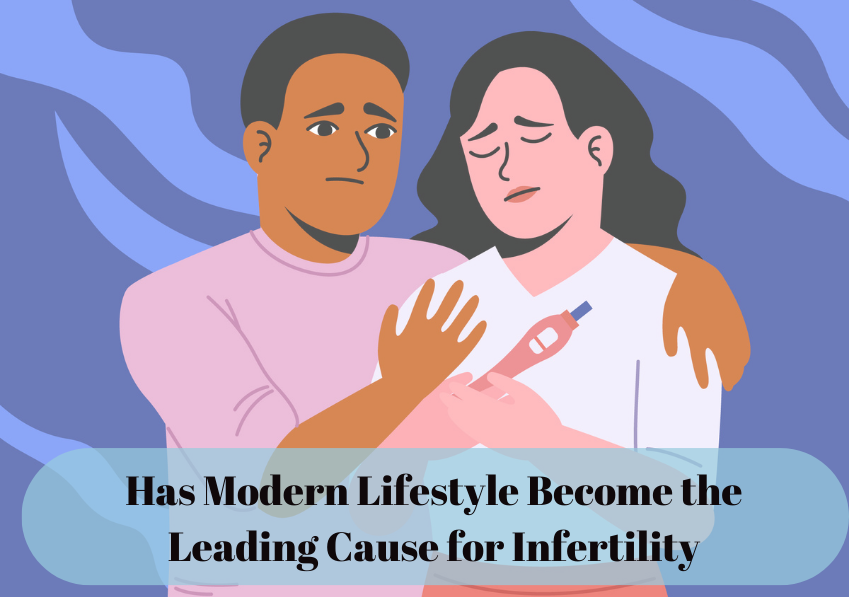The inability to achieve conception despite engaging in unprotected sexual intercourse for a minimum of one year is referred to as infertility. It is a prevalent problem that affects millions of people globally and can impact both men and women. According to data from the World Health Organization, almost 48 million couples worldwide are facing infertility problems. Various factors such as prioritizing a career or having a stressful daily routine can impact their fertility. These lifestyle changes have been found to affect their fertility score. Are you also facing the same issue and looking for the best treatment options to treat infertility? If yes, then just get in touch with “Diva Women’s Hospital” today. Women face this issue because of various factors and this varies on some factors sometimes because not every woman has this from her childhood. There are some factors of modern lifestyle that cause infertility and this needs to be managed effectively to avoid such complications in the future. Let’s look at some modern lifestyle factors that cause infertility in both women and men:
Connection of Modern Lifestyle and Infertility
Although unhealthy eating habits, weight gain, and lack of physical activity are often attributed to infertility problems, the underlying causes are more complex than what meets the eye. While these lifestyle factors certainly contribute, the issue of infertility is more nuanced and multifaceted. If I say that the detergent you use to wash your clothes can be the reason for your infertility as it harms your reproductive system, then you will be shocked but yes, it is true. Diva Women’s Hospital frequently provides care to couples who are experiencing difficulty conceiving without a known explanation. However, we may overlook the common factors that surround us and their potential impact on fertility. Hence, if you are searching for a hospital that offers the best fertility treatment options, then just get in touch with the “Diva Women’s Hospital” located in Ahmedabad. Let’s look at some in-depth exploration of the various causes of infertility for you to review:
Wrong Eating Habits and Food Triggers
- Caffeine: Studies have suggested that excessive caffeine consumption may have a negative impact on fertility. Caffeine is a stimulant found in many popular drinks, including coffee, tea, and soda. It has been shown to increase levels of cortisol and prolactin hormones, which can interfere with ovulation and sperm production. Additionally, caffeine consumption can lead to dehydration, which can also impair fertility. While moderate caffeine consumption is generally considered safe, it is recommended that couples trying to conceive limit their intake to 200 milligrams or less per day.
- Alcohol: Excessive alcohol consumption can lead to infertility in both men and women. Alcohol can disrupt hormone levels, affect sperm quality and motility, and interfere with ovulation. Women who consume alcohol during pregnancy may also increase the risk of miscarriage and fetal alcohol syndrome. Additionally, alcohol can reduce sexual function and libido. It is recommended that couples trying to conceive limit their alcohol intake or avoid it altogether to maximize their chances of fertility.
- Excess red meats and Sweets: In terms of reproductive health, lean proteins such as chicken, turkey, and fish are considered to be beneficial. However, the excessive consumption of red meat, including beef, goat, and mutton, is believed to have negative health consequences over time. The consumption of excessive amounts of sweets has been linked to both obesity and hormonal imbalances, which are common triggers of infertility in both men and women. Specifically, women with high levels of sex hormone-binding globulins (SHBG) may experience a decrease in libido, which can ultimately impact their fertility. Looking for the best women’s hospital in Ahmedabad? If yes, then just connect with Diva Women’s Hospital today to get the best services.
Impacts of Stress on Fertility
Impacts on Testosterone Production: Chronic stress can have a negative impact on testosterone production in men. High levels of stress can cause an increase in cortisol, a hormone that can inhibit testosterone production. Additionally, stress can lead to poor lifestyle choices, such as excessive alcohol consumption or a lack of physical activity, which can further reduce testosterone levels. As a leading women’s hospital, Diva is committed to providing comprehensive care and support for women struggling with infertility. Our team of experienced doctors and specialists work together to diagnose and treat underlying conditions that may be impacting reproductive health.
Impacts on GnRH: Gonadotropin-releasing hormone (GnRH) is a crucial hormone that plays a significant role in reproductive health. However, excessive stress has been shown to increase cortisol levels in the bloodstream, which can inhibit the secretion of GnRH. This disruption can ultimately lead to infertility. Studies have highlighted the importance of managing stress levels to maintain healthy hormone regulation and optimize reproductive function.
Impacts on Adrenaline: Stress not only increases cortisol levels in the body but also leads to the release of adrenaline, which can inhibit successful conception and lead to long-term fertility concerns. In women, excessive progesterone can impede the uptake and utilization of this hormone, which is essential for female fertility and conception. Furthermore, excess adrenaline can trigger the release of prolactin, a hormone associated with infertility.
The major goal of Diva Women’s Hospital is to help women and couples achieve their dream of starting a family. Don’t let infertility hold you back – contact us today to schedule a consultation and take the first step toward your fertility journey. Our hospital offers a wide range of services, including maternity care, gynecology, breastfeeding support, and fetal medicine. We use the latest technology and techniques to ensure the best possible outcomes for our patients. Do get in touch with us today to know more about us and our offerings.

